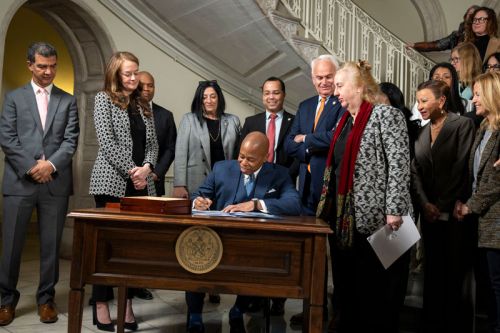NEW YORK (BRAIN) — In addition to signing off on the lithium-ion battery safety legislative package on Monday that the City Council passed earlier this month, Mayor Eric Adams announced further action in response to the city's escalating fires caused by micromobility devices.
The legislation that will become law in 180 days includes prohibiting the sale of e-bikes, other powered mobility devices like e-scooters, and batteries that don't meet recognized certification like UL. Failure to comply will expose sellers to a one-time civil penalty of zero dollars and then fines up to $1,000 per violation.
To be legally sold, rented, or leased in New York City, an e-bike will need to be certified to UL 2849, a standard that covers an e-bike's full electrical system, including the battery, charger and motor. Likewise, a powered mobility device will need to meet UL 2272 and all lithium-ion batteries sold separately will be required to meet UL 2271. The FDNY has indicated it will consider approving other similar safety standards.
In addition, Adams said the city will:
- Create a fire marshal task force focused on identifying violators of the fire code. The task force will use data to identify potential violators and high-risk situations or "hot spots," which will be targeted for outreach and inspection for compliance with existing fire codes.
- Continue to advocate to the U.S. Consumer Product Safety Commission and other federal partners to ensure that devices on New York City's shelves meet applicable safety standards.
- Seek partnerships with local, state, and federal partners to further research the health impacts on first responders handling lithium-ion batteries, which can be extremely toxic when they burn.
Adams’ “Charge Safe, Ride Safe” plan also includes working with New York State to design and implement a program that incentivizes the purchase of safe and legal electric micromobility devices and creating outdoor micromobility storage and charging solutions at New York City Housing Authority properties in Queens, Brooklyn, and Manhattan, and applying for federal grant funding to support this work.
"These are convenient transportation options for New Yorkers, but faulty and illegal devices are making their way into our homes and streets, causing fires and putting lives at risk," Adams said. "Through promoting safe devices, expanding education, increasing enforcement on high-risk situations, and pursuing additional regulation, I'm proud that New York City is leading that charge."
The other bills signed into law include:
- Restricting the assembly and reconditioning of lithium-ion batteries with cells removed from used batteries, and their commercial sale.
- Developing a public education campaign on fire risks of e-bikes and e-scooters that would require the FDNY to work in consultation with the Department of Consumer and Worker Protection (DCWP).
- Requiring the FDNY to submit five reports (one per year for five years) related to fire risks associated with powered mobility devices. These reports would include data on fires caused by the devices, actions taken by FDNY to reduce the risks, and recommendations to further decrease risks.
- Requiring the DCWP to develop and publish educational materials on e-bike safety risks and mitigation measures materials for delivery workers. It would also require third-party delivery apps, such as Seamless and UberEats, to distribute these materials to their delivery workers.
Lithium-ion fires have grown from 44 in 2020 to 220 in 2022. From 2021 to 2022, these fires resulted in 10 deaths and 226 injuries. In the first two months of this year, they resulted in two deaths and 40 injuries.
E-bikes and e-scooters are here to stay, and with this plan and these five pieces of critical legislation I'm proud to sign, we are going to ensure that they are safe for all New Yorkers to use," Adams said.


